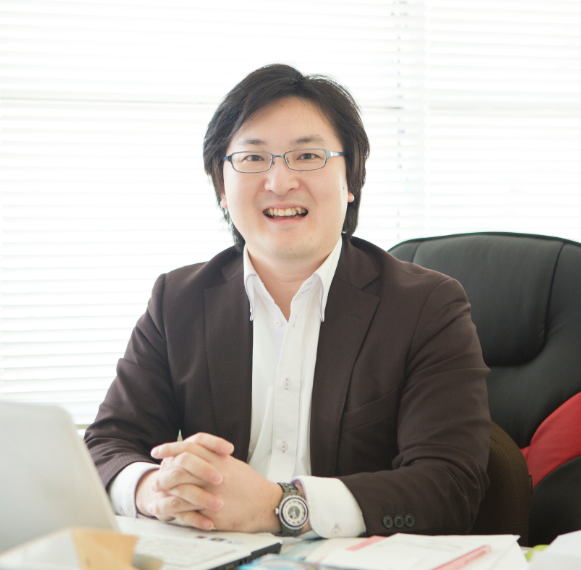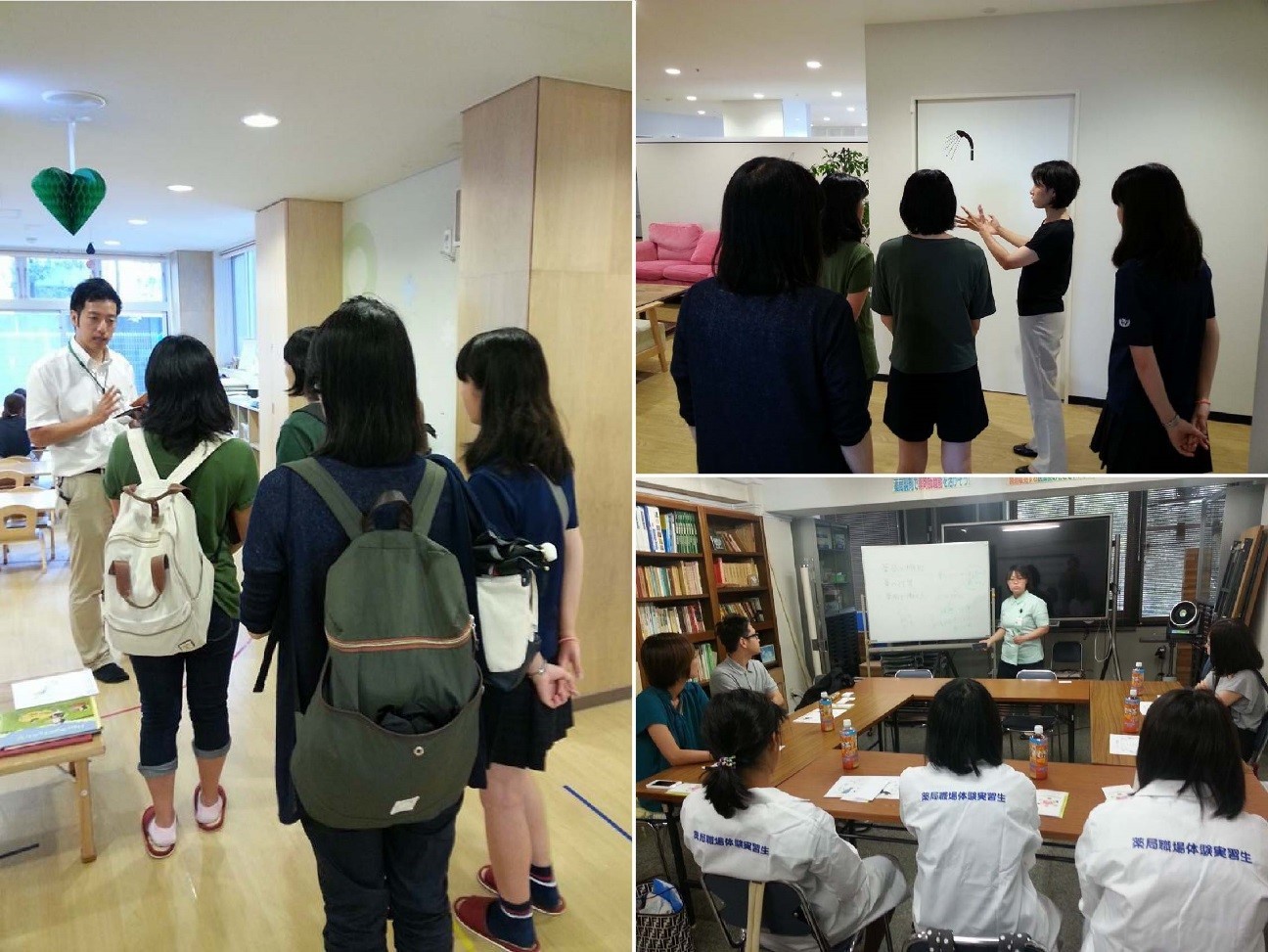NPO Fair Start Support
As one of the charity organisations funded by FIT For Charity 2016, NPO Fair Start Support provides employment assistance to youth in foster care and those from unfortunate background such as family with a history of abuse or poverty. All children who live at foster facilities must leave by the age of 18. To earn a living and/or to pay for tuition, many take on part-time jobs while attending school. Most of the children who leave the foster facilities at 18 years old choose to find employment. However, the process of entering the work force can be unfair to many of the children. NPO Fair Start Support aims to provide more opportunities for these young people so that they may get a fair chance to enter the career field of their choice and make a smooth transition into society. Volunteers from FIT For Charity visited Representative Director, Mr. Teppei Nagaoka, to hear more about his story.

NPO Fair Start Support Representative Director, Mr. Teppei Nagaoka
FIT: Please tell us about yourself and what motivated you to start Fair Start Support.
Nagaoka: I wanted to start my own business by the time I turned 30 years old. Until then I was working at a regular company, thinking about what I should do to achieve that goal. After graduating from university, I worked as a recruiter for two years. One of the clients I met then invited me to help him set up a new recruitment service start-up, so I joined his company.
At the time, “high-spec working poor” (job seekers with an above average academic background who cannot find full-time job) was starting to be recognised as a social problem. Since the start-up I joined mainly focused on targeting people with a high academic background, we were often approached for interviews by the media. Being involved in starting a new business gave me a lot of knowledge, but more importantly I felt that my views of society expanded. Recognising a problem in our society and turning the problem into a business solution played a huge role in this and I found it particularly interesting. I became more curious about viewing and approaching problems in our society from that particular angle. One of the issues I encountered often was how many small-to-mid-sized companies I interacted with had trouble securing enough employees. However, there were many news articles regarding NEET (“Not in Education, Employment, or Training”) and unemployed youth in the media. The society needed more workers, but many young people were not working. The unbalanced supply and demand relationship was a big loss for our society and fixing the balance was something I felt worth doing.
Once I found the direction for my business, I quit my job when I was 28 years old and began thinking about what it was that only I could bring to the current job market. I decided to attend a symposium regarding child poverty. It was then that I learned about foster care children having to leave the facilities at 18 but could not make a smooth transition into society as they often lacked the motivation to find a job. This was a big shock to me as I was also thinking about how to optimize Japan’s young workforce. It is difficult to force someone who does not want to work into the job market. I wanted to find out why they did not want to work and decided to volunteer at a foster care facility in Kamakura. As I was volunteering I talked to many of the students at the facility and found out that many of them had part-time jobs while attending high schools. Once they turned 18, they knew they had to leave the facility, so many of them were saving up for their departure. From interacting with these students, I got the impression that they were well-natured individuals and cared about their future. It occurred to me that the difficulties they faced in finding employment may be caused by their environment, rather than the individuals themselves. By looking deeper into their job-hunting process and which companies they were applying to, many possible reasons began to surface. One of the challenges they faced when looking for jobs was that they prioritised living accommodations provided by companies, such as a dormitory for employees. This was surprising to me as most people care about the details of the job when choosing which company to apply to. However, because they had to leave foster care at the age of 18, prioritising jobs that provided them with housing was more practical.

Young job seekers participating in job experience programs
This may seem obvious, but there were no adults that gave them guidance during their job search. There were nursery staffs, but very few had any ties to other industries. Furthermore, the staffs were already preoccupied with their own duties that they could barely spare time to help the children with their job search. The high schools they attended largely left the decision making to the children and little effort was made in matching the children with jobs they were interested in. With no guidance provided to the children during their job search and the children prioritising companies that provided housing, it seemed rather obvious that they would be mismatched with jobs that they may not necessarily enjoy or be good at. One of the main causes of becoming a “working poor” is that the new recruits often quit their companies after a short period of time. Left unguided with no adults to support them when they face problems at work, they also do not know how to change employment. In the end, many take up menial part-time jobs and see their 20s come to an end with no meaningful progress. I felt that this was wasted potential.
While the children are still at the foster care facilities, someone needs to teach them that the first priority in choosing a job is not whether the company provides housing, but whether the job itself is something that they want to do. The same person who provides the guidance could also act as a bridge between the children and companies. After getting hired, the children could also have someone they could rely on during times when they feel nervous or lacking in confidence. Then less children will quit their jobs after a short time, saying “this was not something I wanted to do.” More children would be able to find a job that is better suited for them and earn a stable salary, thus lowering the number of youth in poverty. In addition, it would allow companies to secure enough workers, which will lead to more taxes and income for the country. Thinking about how worthwhile it would be to realise this positive loop served as the ultimate catalyst in creating the Fair Start facility.
FIT: How may we improve the current situation where many students from foster care facilities end up becoming the “working poor”?
Nagaoka: I believe offering opportunities plays a big role. Children will ultimately need to fend for themselves, so providing them with a process to enable them to independently make decisions and choices is essential. Unfortunately, there is still a barrier between the children at foster care facilities and companies. As an outsider, it may not be an appropriate thing for me to say, but I believe that they are still largely segregated in many ways.
People sometimes say that a child growing up at a foster facility cannot afford to dream. This is not far from reality as many children do not understand what our society can provide for them. There are insufficient opportunities for children to learn how they can prosper in society, which is why we provide them with chances such as connecting with companies and through internships, allowing the children to learn they can live how they want. Such chances are rarely provided to these children unless a third party gets involved, such as Fair Start Support.
FIT: Please tell us when you feel that your activities are making a real impact.
Nagaoka: Seven high school students who were registered with us have recently found jobs in April 2016, and after a year and a half, I am proud to say that none of them have left their jobs. This is an achievement, especially considering one of the biggest issues (surrounding foster care children) is that they often quit their jobs after a short period of time. When the Tokyo Metropolitan Government surveyed children who graduated from foster care facilities, it found that about 40% of young people quit their jobs within one year of getting hired. I personally believe that the actual figure is higher than 40%, and from a survey conducted by Saitama Prefecture, about 75% quit within 3 years. The survey figures are a little higher than average turnover rate for working high school students, so compared to this I consider the turnout of our recent graduates as a success.
It has been about six years since the first group of students that we supported have found jobs. One particular student from was concerned as they had not been able to attend university due to family issues. However, during the fourth year of working full-time, the student told me excitedly about having a new undergraduate reporting to them. From that I could tell that the student had overcome their concerns and accepted themselves. In that moment I felt that we did a good job. I am happy to receive such reports from our students.
FIT: Please tell us about other happy moments.
Nagaoka: I was glad to hear that a graduate we supported had brought gifts to the foster care facility they had previously lived in. The fact the graduate was able to think about others and could spare sufficient money to purchase gifts at a time when they were likely still dealing with managing their own independent life made me particularly happy.
This year I was given the opportunity to present the activities and results of Fair Start at a seminar for workers at foster homes hosted by the Japan National Council of Social Welfare. In addition, an organisation has requested work from us, we have also documented the support cases we have worked on and increased our work matching capability. It’s wonderful to receive such requests and by working with such organisations we are able to increase Fair Start’s brand awareness. I’m excited to feel that our 7 years of activities has been recognised.
We have also been able to employ people to increase our activities. Last year we hired a young person as a full time employee who had come from a foster home. We are able to realise our goal through our own organisation. As we grow, more possibilities are realised and we become closer to what I imagine for the world. This increases as we support more children. I really enjoy this growth and progress.
FIT: Do you have plans to expand a system like Fair Start Support nationwide in the future?
Nagaoka: So far we have mainly focused our operations in Kanagawa, but starting this year I have visited many foster care facilities in the Kanto area, including Gunma, Ibaraki, Shizuoka, Tochigi, Chiba, and Saitama. Last month, we gathered a number of local small-to-mid-sized companies and foster care facility staffs and hosted a meeting to exchange ideas. One staff member voiced that they too, want to be connected to various companies and industries. The staff worry about the children even after they graduate, but since they do not know how to connect the children with job opportunities, they have mostly left the career support role to high schools. The staffs and local industry leaders shared a common desire to address the issue, however, they did not know how to improve the situation. I am glad that we have expanded our activities to various areas. It was also a moment that proved my hypothesis to be true, that the foster care facilities also wanted to help connect the children to various companies.

Young students participating in company tours organised by NPO Fair Start Support
FIT: Do you host any meetups between working graduates and students?
Nagaoka: We host Christmas parties and New Year parties during the holiday seasons. Next year in March, we are planning to hold a celebration for the new graduates who have found jobs. It is always a pleasure to see familiar faces, but going one step further, I believe it creates a synergy. Every new graduate and student at the parties are doing their utmost to achieve positive results in their lives, so I think that introducing them provides a good stimulus for both parties.
FIT: By interacting with the students and graduates, have there been times when you felt motivated to improve yourself as well?
Nagaoka: In terms of improvements, when I hear of graduates that we supported quit their jobs prematurely, I think about how we could have prevented it from happening. I will need to gain a better understanding of the students, and improve my know-how.
FIT: Please tell us about your future goals.
Nagaoka: At the moment, I believe that having an organisation such as Fair Start Support to bridge the youth in foster care and the workforce is one way of improving the current situation. However, there is no organisation like us on a nation-wide scale. If the foster care facilities and companies were to connect with each other directly, then many positive outcomes could spring from those relationships. By preparing the children for their transition into the society at the foster care facilities, we hope to build connections between the youth and companies.
For example, high school students have a tendency to look for jobs in their hometown, but it is also true that many young people leave the countryside. This is problematic for the rural economy. While there are numerous small-to-mid-sized companies in the rural areas, many of the youth today flock to big cities such as Tokyo and face difficulties, because they believe there is no job for them in the countryside. The youth who have had a chance to interact with various companies early on realise that there are many companies with potential in their own hometown. By working for a local company close to home, there is less anxiety after employment, and the rural economy also benefits from having a young workforce. Then all parties would be happy, create a positive feedback loop, and have a meaningful impact on the local society. This is what I want to achieve across the country.
There is still much potential buried in our workforce. Part-time high school students are such examples. Many of them graduate from school without a clear direction in their lives. In Kanagawa Prefecture alone, nearly 40% of the students graduate without enrolling into university. They must choose whether to work casual jobs, or to not work at all. This is another example of buried potential. In Japan, we have a young workforce that can achieve great results. I hope to work with the young workforce, not only within foster care facilities, but also in other various places.
FIT: Thank you very much for your time.

